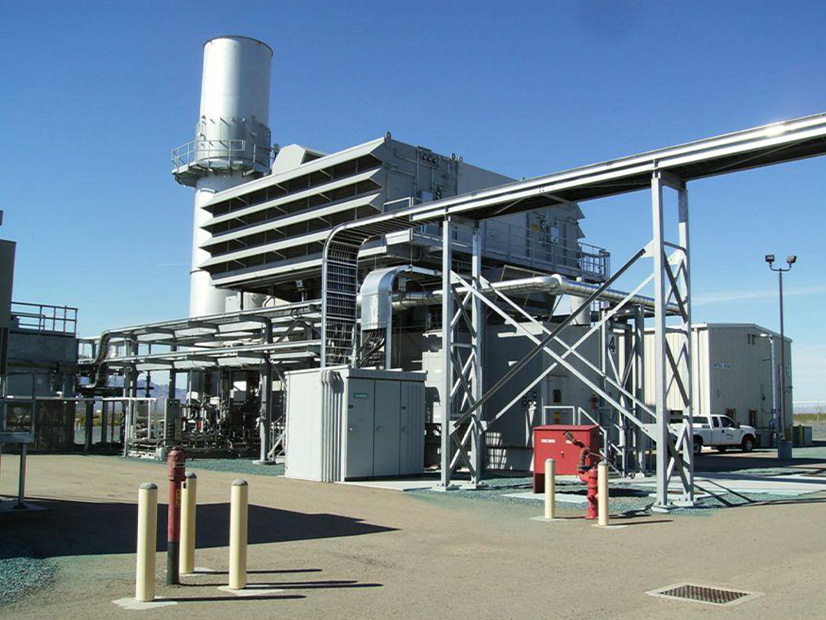
Arizona regulators voted to allow UNS Electric to expand its gas-fired Black Mountain Generating Station without a certificate of environmental compatibility — a decision critics said sets a “troubling” precedent.
The Arizona Corporation Commission voted 4-1 on June 11 to grant a “disclaimer of jurisdiction” to the 200-MW expansion. UNS successfully argued that the project’s four natural gas-powered units, each with a nameplate capacity of 50 MW, individually fall under the 100-MW threshold at which a certificate of environmental compatibility is required.
The commission’s vote overturned a decision from the Arizona Power Plant and Transmission Line Siting Committee, which viewed the expansion as a 200-MW project that needed an environmental certificate.
In another decision from the June 11 meeting that’s facing criticism, the commission voted 4-1 to remove the requirement for an independent, third-party review of utilities’ integrated resource plans. The decision came after ACC staff said they couldn’t find a consultant to do the work within budget after issuing two requests for proposals.
The decision applies to IRPs filed in November by Arizona Public Service, Tucson Electric Power and UNS, as well as future integrated resource plans.
1st Time in 50 Years
UNS’ application for the Black Mountain expansion is the first time any company has sought a disclaimer of jurisdiction for a power plant since the state legislature enacted line siting statutes in 1971, according to the Line Siting Committee.
The process for obtaining a certificate of environmental compatibility includes public outreach and hearings before the Line Siting Committee and the ACC.
Western Resource Advocates said the commission’s decision “creates a troubling new precedent for gas and electric utilities seeking to build new generation facilities.”
“This is a disappointing decision that overturns decades of commission practice to essentially exempt most gas plants from commonsense environmental review, depriving Arizonans of a voice in siting these large, polluting industrial facilities,” WRA attorney Emily Doerfler said in a statement.
In a statement after the vote, ACC Executive Director Doug Clark said that “the law as written left the commission no choice but to disclaim jurisdiction.” It’s up to lawmakers to change the wording, he said in a release.
The Black Mountain expansion still must obtain permits from state and local agencies, including the Arizona Department of Environmental Quality, Clark said. And UNS will need a certificate of environmental compatibility for interconnection with related transmission lines.
UNS said an expansion of the Black Mountain Generating Station is needed for reliability in its service territory. The power plant, near Kingman in Mohave County, now has two 61-MW units that started operating in 2007.
The expansion is expected to cost $218 million and to begin operations in 2027.
IRP Review
The requirement for third-party review of utilities’ integrated resource plans came from a commission decision in 2018 aimed at improving the IRP process.
The decision ordered an independent review of scenarios and resource portfolios in each IRP and projected costs and benefits. The review could include the development of alternative scenarios and portfolios that the third-party analyst thinks should be considered.
“Their specialized experience … allows them to provide an unbiased and critical assessment to validate or challenge the assumptions and conclusions presented by the utilities in their IRP filings,” WRA said in a letter to the commission.
Alex Routhier, WRA’s senior policy adviser in Arizona, said the third-party review is even more important because ACC is short-staffed and lacks the expertise to run complex modeling on its own. The third-party analysts are familiar with what’s happening industry-wide and best practices that are in use, he said.
Commissioner Anna Tovar said the requirement for third-party review is needed to counter inaccurate data and modeling the commission receives.
“You’re assuming that all that data and modeling is correct, and you don’t have the skill set to deviate and prove that it’s not,” said Tovar, who cast the lone vote against removing the requirement. “I would say that is my biggest issue in regard to that.”
Commissioners who voted in favor of removing the requirement for third-party analysis said staff still could hire a consultant to review IRPs, but the step no longer would be required.
Commissioner Nick Myers said some stakeholders had been given access to the modeling platform the utilities use and could run their own analysis or hire someone to do so.
And Chair Jim O’Connor noted the commission only “acknowledges” IRPs rather than voting to approve them.



